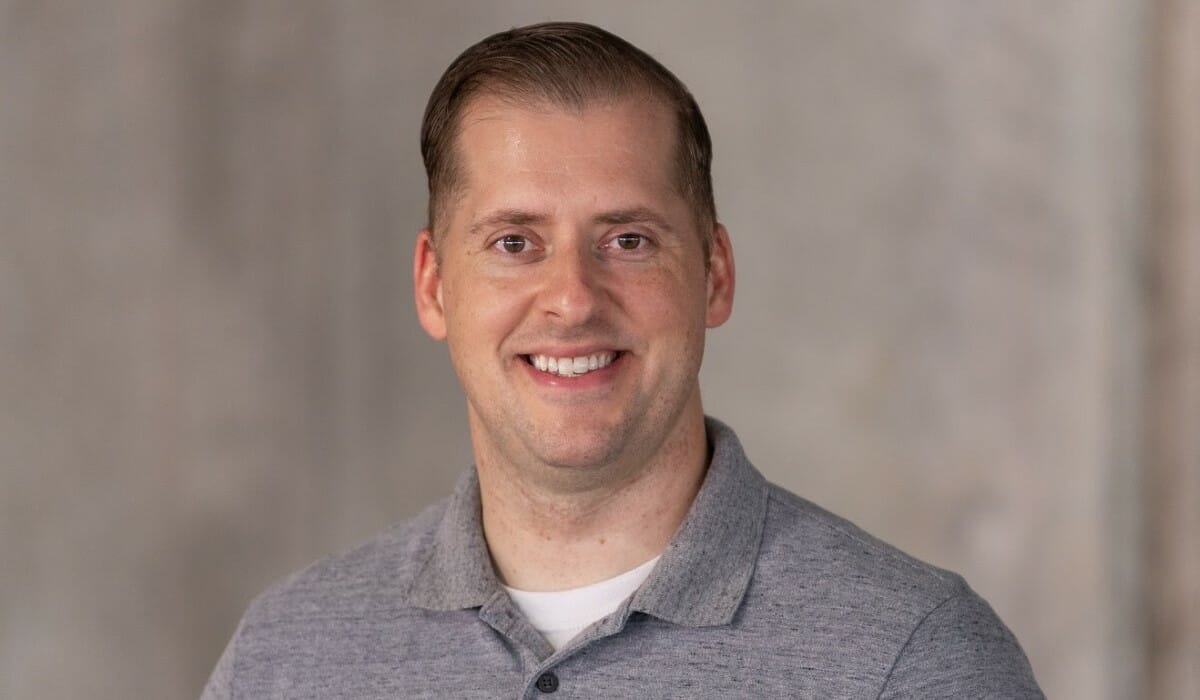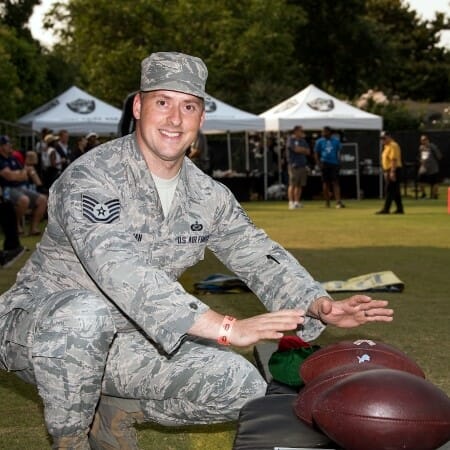Air Force Veteran Changes Lives with Suicide Prevention Training

Meet Daily Point of Light Award honoree James Hodgman. Read his story and nominate an outstanding volunteer or family as a Daily Point of Light.
Content Warning: Points of Light is proud to share the following uplifting and inspiring story. However, we acknowledge that a small portion below may be difficult for some readers. We encourage you to please care for your own wellbeing above all.
When he was stationed at Travis Air Force Base in California, James Hodgman discovered LivingWorks, one of the world’s top suicide-prevention training programs. He went through the training and learned invaluable lessons regarding spotting someone in need and having difficult conversations to help them. But James didn’t stop there — he then became an instructor.
James has also helped close to 200 people who went through crisis situations as a counselor with Crisis Text Line. Growing up in a small town, James remembers always wanting to extend support to the people around him. This is exactly what he’s instilling in his own children.
Describe your volunteer role with LivingWorks SafeTalk.
I was stationed at Travis Air Force Base in California from July 2014 to March 2021. In November 2020, the base offered the LivingWorks SafeTalk Suicice Prevention training class along with the workshop called ASIST. They also offered the certification program to become a trainer who helps people dealing with mental health struggles and ultimately to help prevent suicide.
Unfortunately in the Air Force and across our military, suicide happens far too often. One is too many. There was a while when we were having triple-digit suicides every year, so I’ve been passionate about suicide prevention and doing all that I can to help my fellow military members, my fellow Airmen and just people in general to battle whatever they’re going through and push through it in a way that can help them move on. So I started the class and I became certified. I think I taught my first class and Safetalk in January the following year.
So far I’ve taught a couple of SafeTalk courses at Travis Air Force Base, and one at Patrick Space Force Base. The COVID-19 pandemic also kind of threw a wrench in things because unfortunately SafeTalk is not a class that can be taught virtually. I’m actually thankful to be able to get back after it and go into classrooms to teach. I’m also actually in the process of linking up with a local church here. I’m hoping to meet with them sometime soon to see if we can hold SafeTalk classes at their facility.

What curriculum do you teach your classes and how has it helped them?
LivingWorks SafeTalk stands for Suicide Prevention for Everyone: Tell, Ask, Listen, Keepsafe. The whole idea behind the class and curriculum is how much better would it would be if everybody in our community or more people in our community were more alert to the possibility of suicide and were aware of the actions that they could take to help prevent it. So the curriculum is about enhancing suicide awareness, the possibility of suicide happening or maybe somebody considering suicide.
It teaches people how to get involved, how to have those tough conversations and how to recognize that somebody is asking for help. There are a bunch of things that people considering suicide may exhibit, whether it’s body language, things that they say or things that they do that could indicate thoughts about taking their own life.
Describe your volunteer role with Crisis Text Line.
Crisis Text Line is a 24/7 operation that’s anonymous and offers free support for anybody who could be going through anything at all who needs someone to talk to. In March of 2019, I heard about Crisis Text Line and the opportunity to become a crisis counselor with them. I was very interested in it because I’ve always just been passionate about helping people. I’m also a resiliency instructor for the Air Force, and some of those things paralleled into things I do for the Crisis Text Line. I liked the idea that they were a 24/7 operation that helps people no matter where they’re at and no matter what situation.
Crisis counselors have to complete 30 hours of training with different modules and they link you up with a supervisor and a great team. I’ve been able to help over 200 people dealing with all kinds of things from anxiety and depression to suicidal thoughts. Several times I’ve been the person on the other end of the computer, trying to help people through whatever they may be going through.
Do you have a favorite memory from your volunteerism?
This memory kind of encompasses why I’m so adamant about SafeTalk. I had a friend a couple years back in Germany, we were stationed together there when I was at the Ramstein Air Base. I moved on to California in 2014 and he stayed there. He wanted to retire from the military and get a civilian job there. I saw him years later when he put a video on his Facebook page, basically talking about ending it. It looked like he was saying goodbye to the world.
I reached out to him and I used the skills that I learned through the Crisis Text Line and everything else. I spoke to him on the phone for two hours just trying to put the idea that he had more to live for and that his life wasn’t over yet in his head. There were brighter days ahead. We were able to keep him alive and got him into a medical facility. He was able to have a few more years with us. He recently passed away, but I always look back on that moment and think that through that experience he had a few more years of his family, and I think that matters.
What inspires you to volunteer?
There’s a couple of things that inspire me to volunteer. I grew up in a small town in Troy, New Hampshire. I was always brought up to help others and do what you can to help out the person coming up behind you. As a father I also think it’s incumbent upon me to teach them the value of service; what it means to give back and why it’s so important. I want to encourage them to find their own way to where they can help others in their lives.
What have you learned through your experience as a volunteer?
Through Crisis Text Line, I’ve learned that many people will almost trivialize what somebody’s going through; they might make light of somebody’s situation. I’ve learned that you can never discount what somebody is going through because you’re not in their shoes and you’re not experiencing those emotions. It’s critical that we never discount, condescend or talk down to somebody. We should meet them where they are and give them what they need at that time to help them out. That’s been pretty important.
Why is it important for others to get involved?
There’s somebody right now who’s struggling and they could be in your community or city. So there’s always a need, and whatever you can do to help is appreciated. Even a conversation with someone about their life could be instrumental in improving their condition.
Find what you’re passionate about, and pursue that. The impact that you can have on somebody else’s life can be monumental.
If you or someone you know may be considering suicide, contact the National Suicide Prevention Lifeline by dialing 988, or text HOME to 741741 to talk to a trained crisis counselor through Crisis Text Line. Both resources are anonymous, free and available 24/7.
Do you want to make a difference in your community like James? Find local volunteer opportunities.
